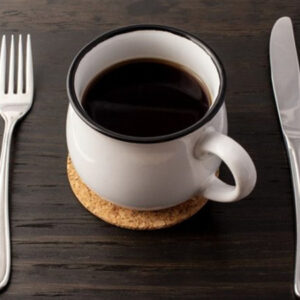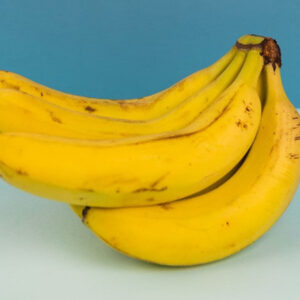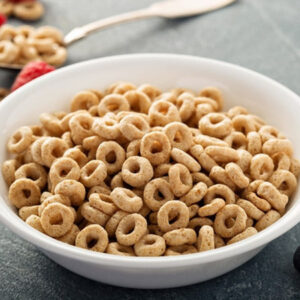
Popcorn, a beloved snack enjoyed by many, raises the question: Does popcorn expire? As with any food product, popcorn has a shelf life that determines its freshness and quality.
In this article, we will delve into the topic of popcorn expiration, exploring factors that affect its shelf life, signs of spoilage, proper storage techniques, and how to make the most of your popcorn.
What Factors Determine the Shelf Life of Popcorn?

The shelf life of popcorn can be influenced by several factors that impact its freshness, quality, and overall safety. Understanding these factors can help you make informed decisions about the storage and consumption of popcorn. Here are some key factors that determine the shelf life of popcorn:
1. Packaging
The type of packaging plays a crucial role in preserving the freshness of popcorn. Popcorn is commonly available in various types of packaging, including bags, boxes, or containers. Look for packaging that is specifically designed to be airtight and moisture-resistant. Proper packaging helps protect the popcorn from exposure to air and moisture, which can lead to staleness, loss of crunchiness, and potential mold growth.
2. Storage Conditions
The way you store popcorn greatly affects its shelf life. Temperature, humidity, and exposure to light are critical factors to consider. Popcorn should be stored in a cool, dry place, away from direct sunlight and heat sources.
High temperatures can accelerate the degradation process, making popcorn go stale more quickly. Excessive humidity can introduce moisture, leading to potential mold growth. Maintaining optimal storage conditions is essential to preserving the freshness and quality of popcorn.
3. Moisture Content
Moisture content is a significant factor in determining the shelf life of popcorn. Popcorn naturally contains some moisture, and excess moisture can cause it to become stale or lose its desirable texture. Moisture can also create an environment conducive to mold growth. Properly dried and stored popcorn has a longer shelf life as it minimizes the risk of moisture-related spoilage.
4. Exposure to Air
Exposure to air can contribute to the degradation of popcorn. When popcorn is exposed to air, it can become stale, lose its crunchiness, and absorb moisture from the surroundings. Airtight packaging and storage containers help minimize air exposure and maintain the popcorn’s freshness for a longer duration.
5. Quality at Purchase
The quality of the popcorn at the time of purchase can influence its shelf life. It is important to select popcorn that is fresh, free from any signs of damage or pests, and within its recommended expiration date. Quality control measures by popcorn manufacturers play a significant role in ensuring that the product reaches consumers in optimal condition.
How Can You Tell If Your Popcorn Has Expired?
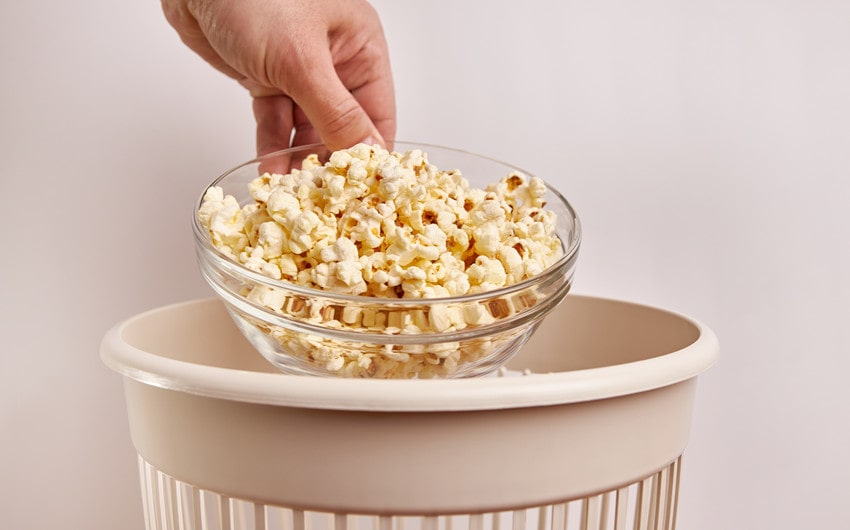
To ensure food safety and the best snacking experience, it’s important to be able to identify signs of spoilage in popcorn. Here are some indicators that your popcorn may have expired:
1. Unusual Odor
Popcorn that has gone bad may have a noticeable off odor. If you detect a strong, unpleasant smell, it is likely an indication of spoilage. Trust your sense of smell and if the popcorn emits an unusual or foul odor, it’s best to avoid consuming it.
2. Discoloration
Look closely at the popcorn kernels or popped popcorn for any changes in color. If you notice significant discoloration, such as darkening or browning, it could be a sign of spoilage or rancidity. Fresh popcorn typically has a light, golden color, so any noticeable deviation should raise concerns about its quality.
3. Presence of Mold
One of the clearest indications that popcorn has expired is the presence of mold. If you see any fuzzy or powdery growth, patches of green, blue, or white spots on the popcorn, it is essential to discard it immediately. Mold can produce harmful toxins that can lead to foodborne illnesses.
4. Texture and Taste
Expired popcorn may exhibit changes in texture and taste. It may become chewy, limp, or lose its desirable crunchiness. Stale or rancid popcorn can have an off or unpleasant taste. If the texture or taste seems abnormal or unappealing, it is best to err on the side of caution and avoid consuming it.
How Long Does It Take for Popcorn to Expire?
When it comes to the shelf life of popcorn, the duration can vary depending on various factors such as storage conditions, packaging, and the type of popcorn.
1. Do Unpopped Popcorn Kernels Expire?

Unpopped popcorn kernels have a longer shelf life compared to popped popcorn. When stored properly, unpopped kernels can maintain their quality for up to two years. The key is to keep them in a cool, dry place away from moisture and excessive heat.
Moisture can cause the kernels to lose their poppability and become stale, while heat can accelerate the deterioration process. It’s recommended to store unpopped kernels in an airtight container or a sealed package to prevent moisture absorption and maintain freshness.
2. Does Popped Popcorn Expire?
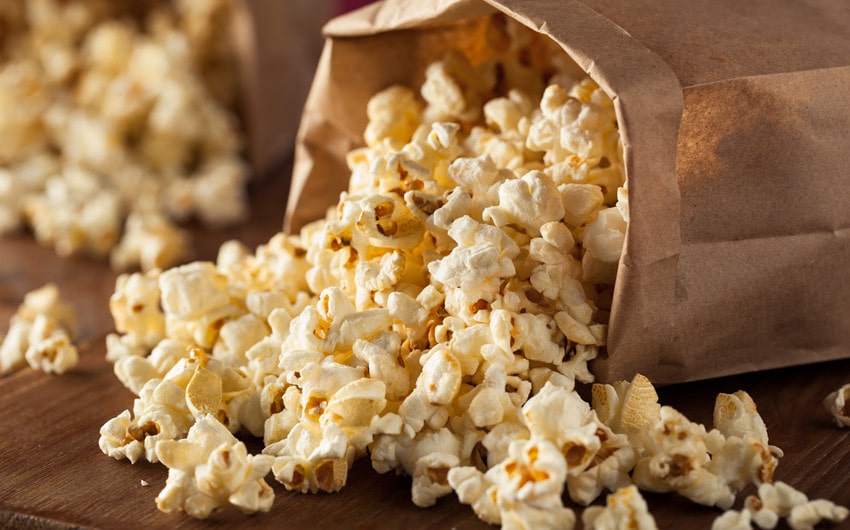
Popped popcorn, unlike unpopped kernels, is more susceptible to losing its freshness and desirable texture. When popcorn is exposed to air, it can become stale and gradually lose its crispness. While there is no specific expiration timeline for popped popcorn, it is best consumed within a few days of being popped. After this period, it may start to lose its crunchiness and become chewy.
To maintain its quality for as long as possible, store popped popcorn in an airtight container or resealable bag to minimize exposure to air and moisture. However, it’s important to note that popped popcorn will eventually lose its freshness, so it’s best to enjoy it sooner rather than later.
It’s important to note that while popcorn may not necessarily “go bad” in the sense of becoming harmful to consume, it can lose its desirable qualities over time. As the popcorn ages, it may become chewy, lose its crispness, or develop a stale taste. Therefore, to fully enjoy the flavor and texture of popcorn, it is advisable to consume it within a reasonable timeframe.
3. Does Microwave Popcorn Expire?
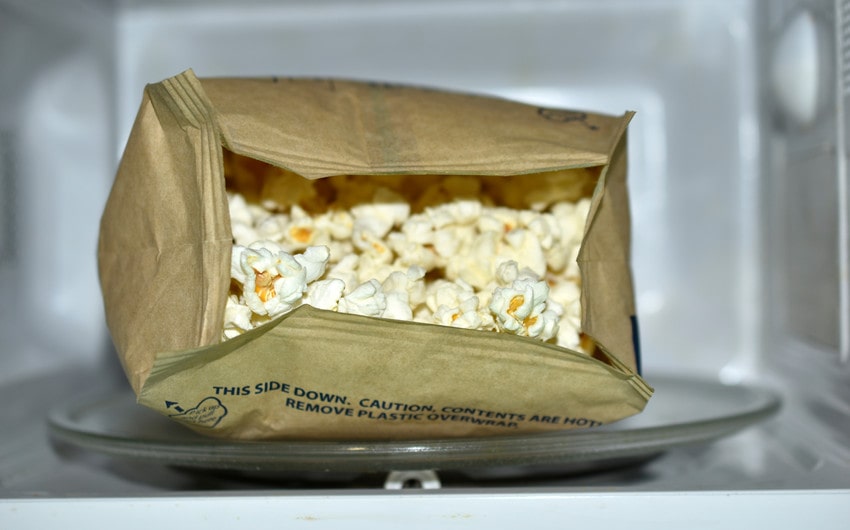
Microwave popcorn comes with an expiration or “best by” date, indicating the recommended timeframe for optimal quality and taste. However, it does not necessarily mean the popcorn becomes unsafe to consume after that date. Factors such as storage conditions, packaging, and exposure to moisture and air affect the shelf life of microwave popcorn.
If the package remains sealed and undamaged, microwave popcorn can generally maintain its quality beyond the expiration date. Inspect the packaging for any signs of damage or compromise. Use your senses to assess the popcorn’s aroma, color, and texture before preparing and consuming it.
If the microwave popcorn is well-sealed, shows no signs of spoilage, and smells and looks fresh, it is likely safe to enjoy even after the expiration date. Store it in a cool, dry place away from moisture and excessive heat to maintain its quality.
Remember, expiration dates are guidelines, and it’s crucial to use your judgment. When in doubt, discard microwave popcorn that appears compromised or has passed its expiration date to prioritize food safety.
4. How Long Does Flavored Popcorn Last?
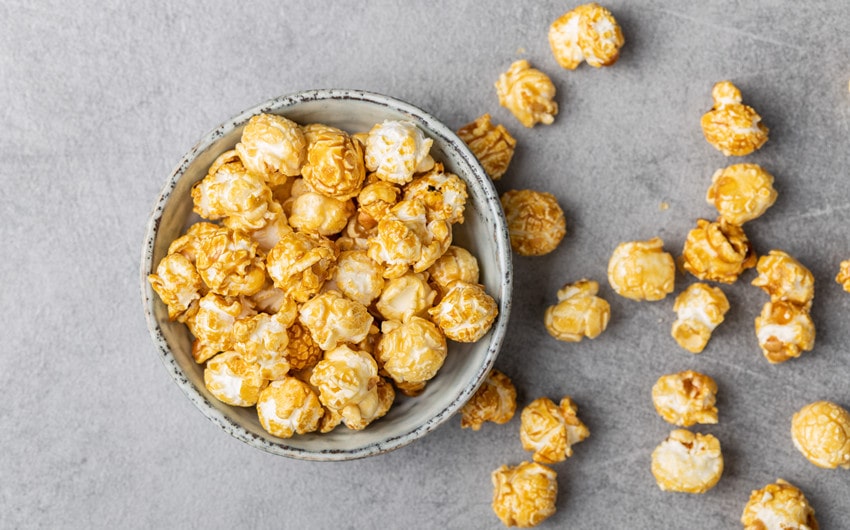
Popcorn comes in various flavored varieties, such as caramel, cheese, or spicy flavors. These flavored popcorn options often have additional ingredients and seasonings that can affect their shelf life.
It’s important to refer to the package’s expiration date and storage instructions for specific flavored popcorn varieties to ensure their freshness and taste. Factors such as the freshness of the added ingredients and the overall quality of the product play a role in determining their shelf life.
5. How Long Does Ready-to-Eat Popcorn Last?

Ready-to-eat popcorn refers to pre-packaged or store-bought popcorn that is ready for immediate consumption. These popcorn products typically have a stated expiration date on the packaging.
The shelf life of ready-to-eat popcorn can vary depending on factors such as the packaging quality, preservatives used, and storage conditions. It’s important to adhere to the expiration date and storage instructions provided by the manufacturer to ensure the best quality and taste.
6. How Long Does Homemade Popcorn Last?

Homemade popcorn refers to popcorn that you prepare yourself using your preferred method, whether it’s on the stovetop, in an air popper, or in a popcorn machine. The shelf life of homemade popcorn can vary depending on factors such as the freshness of the ingredients used, the storage conditions, and the absence of added preservatives.
It’s best to consume homemade popcorn within a few days of preparation to enjoy it at its freshest and maintain its desirable texture and taste. Proper storage in an airtight container in a cool, dry place can help extend its shelf life.
How Should You Store Popcorn to Maintain its Freshness?
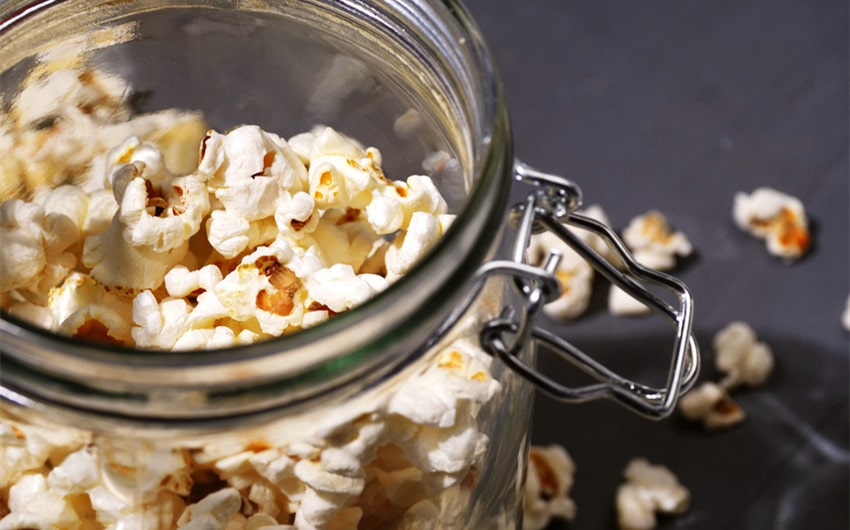
Proper storage is key to maintaining the freshness and quality of popcorn, whether it’s unpopped kernels or popped popcorn. Consider the following guidelines to ensure your popcorn stays fresh:
1. Keep it in a Cool, Dry Place
Popcorn should be stored in a cool and dry location, away from direct sunlight, heat sources, and moisture. Excessive heat can cause the popcorn to become stale or lose its crunchiness, while moisture can lead to the growth of mold. A pantry or cupboard is an ideal storage spot, provided it is away from humid areas like the kitchen or bathroom.
2. Use Airtight Containers or Resealable Bags
Transferring popcorn to airtight containers or resealable bags helps to protect it from exposure to air, which can accelerate staleness and moisture absorption. Airtight containers with a secure lid, such as glass jars or plastic containers with a tight seal, are excellent options. Similarly, resealable bags designed for food storage can keep popcorn fresh by preventing air and moisture from entering.
3. Avoid Refrigeration or Freezing
Unlike some food items, popcorn does not benefit from refrigeration or freezing. The moisture in the refrigerator or freezer can lead to loss of crunchiness and adversely affect the quality of the popcorn. It is best to store popcorn in a cool, dry place at room temperature to preserve its texture and taste.
4. Protect Against Odor Absorption
Popcorn has a tendency to absorb odors from its surroundings. To prevent this, store popcorn away from strong-smelling substances, such as spices, cleaning agents, or pungent food items. Additionally, consider using odor-neutralizing agents like silica gel packets in the storage container to help maintain freshness.
5. Avoid Excessive Handling
Excessive handling of popcorn can introduce moisture and compromise its freshness. It is advisable to avoid frequent opening and closing of containers or bags, as this exposes the popcorn to air and humidity. Instead, scoop out the desired amount of popcorn at once, then seal the container or bag promptly to minimize moisture absorption.
To further illustrate the best way to store popcorn, we have an informative video. In this video, you’ll learn expert tips and techniques for maximizing the shelf life of your popcorn, ensuring it stays fresh and delicious for longer periods.
What Can You Do with Expired Popcorn?
If you find yourself with expired popcorn that is no longer suitable for consumption, there are alternative ways to put it to use rather than simply discarding it. Here are a few creative ideas:
1. Crafts and Decorations
Expired popcorn can be repurposed for various craft projects and decorations. You can use it for stringing garlands, creating popcorn wreaths, or even making popcorn art by gluing the kernels onto paper or other surfaces. These crafts can be a fun activity for kids or a creative way to add a rustic touch to your home decor.
2. Feeding Wildlife
Animals like birds, squirrels, or even chickens can enjoy popcorn as a treat. Ensure the popcorn is not heavily seasoned or salted, as certain seasonings can be harmful to wildlife. Scatter the popcorn in your backyard or a designated feeding area and watch as the animals happily snack on it.
3. Popcorn Ball Treats
Expired popcorn can be transformed into delightful popcorn balls, a classic treat loved by many. Simply melt marshmallows or caramel, toss the popcorn in the sticky mixture, and shape it into balls. Allow them to cool and set before enjoying these sweet and crunchy treats. You can even get creative by adding additional ingredients like chocolate chips, nuts, or dried fruits.
4. Arts and Science Projects
Expired popcorn can be used for educational purposes or science experiments. For example, it can be utilized for counting and sorting activities with young children or as a material for studying density by observing how popcorn behaves in different liquids. It can also serve as a filler in sensory bins or be used as a base for art projects like mosaics or collages.
While repurposing expired popcorn can be a fun and inventive way to give it a new life, it’s important to note that consuming expired or spoiled food items is not recommended. To ensure your health and safety, it’s best to rely on fresh and properly stored popcorn for your snacking enjoyment.
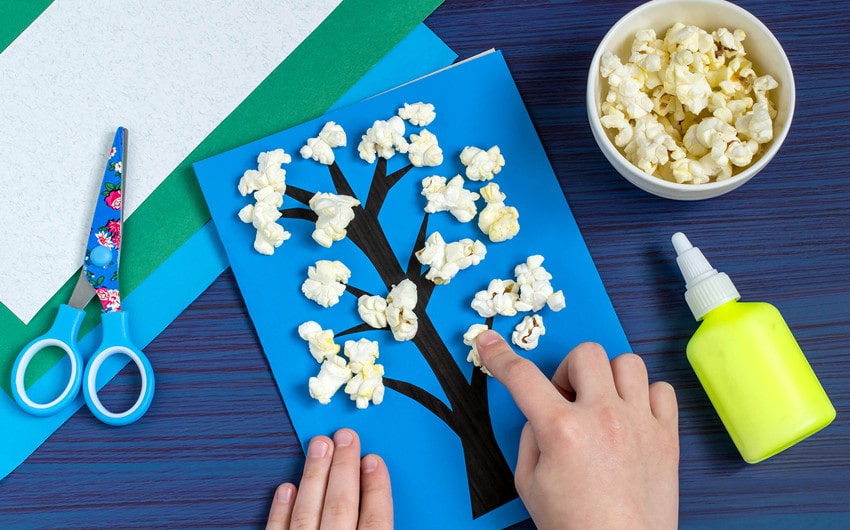
Conclusion
While popcorn does have a shelf life, proper storage and attention to expiration dates can help maintain its freshness. By understanding the factors that affect popcorn’s shelf life, recognizing signs of spoilage, and following storage guidelines, you can enjoy this popular snack safely and at its best quality.
Remember to check expiration dates, store popcorn properly, and trust your senses when determining if popcorn has expired or is still good to enjoy.



